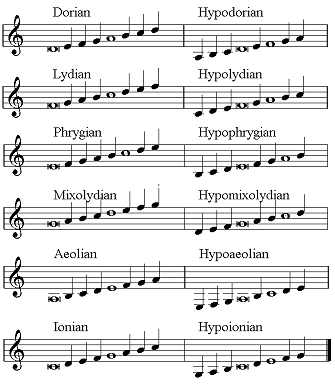Last week, we discussed translating major exercises to minor. Now we’ll go a step further and look at some exercises in the other modes.
To me, modes were just a bunch of Greek names I memorized during undergraduate music theory. I never practiced them and I never played them (as far as I knew). But modes are a great stepping-stone to jazz and world music and a wonderful challenge in the practice room.
Let’s take a moment to understand the modes.When I first learned modes, I learned them by starting on successive notes of the C major scale, like so*:
This is an easy way to remember the order of the modes, but a bad way to learn how to play them or what they sound like. For that purpose, it’s better to start them all on C and talk about their differences. Now we will sort the modes into two groups:
Major modes
Major modes start with two whole steps – the same “do re mi” as a major scale. The triad built on the first note is also a major triad, so overall these modes have a major “flavour.” To get from the major scale (Ionian) to the two other major modes, we only have to change one note:
Minor modes
For minor modes, the tonic triad is minor. However these modes can sound a little strange to the ear and might not immediately register as “minor”:
Note that if you use movable do solfege and start your minor scales starting on “La”, the two altered syllables are the same for the major and minor modes: “fi” and “ta”. However, if you use fixed do, this is probably just annoying you, so feel free to ignore it.
Unlike minor scales, which can be tricky in translation from major, the modes are fairly straightforward. Take a week now and then and play all your exercises in one of the modes (in all twelve keys of course). After a month or two they will feel as comfortable as your major and minor scales.
Happy practicing!
*Note: today’s post omits the Locrian mode… but it’s kind of weird so maybe we’ll talk about it later.




